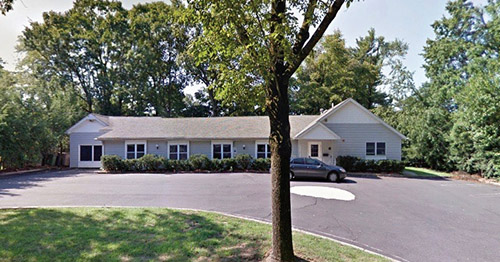

The small blue shul on the corner of Arnot Place and Farview Avenue in Paramus has become home to the town’s Sephardic community. What was once K’hal Adath Jeshurun now operates as the Sephardic Congregation of Paramus, or SCOP.
The SCOP community started as a Sephardic minyan in the nearby Congregation Beth Tefillah, but many members wanted to branch off and create their own minyan in the Sephardic tradition, explained Elvis Zakaim, President of the SCOP shul. The KAJ community was dwindling, as many members had moved away to be closer to their grandchildren.
There are still original members of KAJ that attend the new shul, but the transition has been smooth and seamless. “It’s a very nice atmosphere and very accepting,” said David Lemberger, a board member of SCOP and a former member of KAJ. He is happy that the new community keeps the shul alive and kicking.
The idea for a Sephardi minyan was a 20-year dream, SCOP member Jacky Rehanian explained. For a number of years, the minyan used to rent the gym of a local elementary school for the high holidays; they combined with the Sephardi members of the conservative JCC in Paramus in order to make a minyan to hold Sephardic services. When they first started high holiday services there, they had 200 people attending, which motivated the community to expand their services to a weekly basis, Rehanian explained. “We didn’t have a place of our own so many families generously opened up their homes to allow the community to daven there every Shabbat,” said Rehanian. However, in the winter time, it became harder to move the Torah, siddurim and other necessities for davening. The community approached Beth Tefillah with the idea to rent their Beit Midrash on Shabbat. “We happily davened there until the time KAJ approached to us to merge,” Rehanian said.
The Sephardim wanted an opportunity to celebrate their traditional davening and culture more often, and so the community worked together to bring that dream into fruition, explained Rehanian. When KAJ offered to merge their minyanim, the growing Sephardic community took hold of that opportunity.
The members of the shul are working on making the community stronger and more independent. Shul board member Hersel Benji described the work the community is putting in to find a rabbi. The shul put together a search committee and have some new prospects. “We are searching all over,” Benji said. They’ve been publicizing at Yeshiva University, Brooklyn and Lakewood.
The shul boasts their own Keilim and women’s mikvah, which they encourage members of Paramus and neighboring communities to take advantage of. Experienced mikvah ladies keep the mikvah well maintained, explained Benji. He encouraged anyone using the keilim mikvah to donate tzedakah in the pushkah inside.
According to the shul’s president, the building itself may also go through renovations some time in the near future to better accommodate its members, especially during the high holidays. Benji described their plans for a roomy shul with two floors, a kiddush room and even a learning center. Benji’s dream for the shul is to become a learning center for the members of the community. “We’ll make a torah center where we’ll have learning a few times a week for men, women and kids,” Benji said. The purpose of the shul is to encourage its members to feel more connected to Judaism in a variety of ways. “It’s not just for davening, but for learning as well.”
The shul has been a part of a lot of social events both independently and with Beth Tefillah. Their goal, according to Rehanian, is to maintain a thriving and cohesive community. The shul participated in the Paramus Sukkah hop over the recent holiday, and holds a weekly ladies learning every Shabbat, an event open to women from both shuls.
Rehanian acknowledged that none of the community’s growth would have happened without everyone’s dedication and contribution to making the shul what it is. “Nothing would have happened without the support of the community to bring a long time dream alive,” said Rehanian. She sees a bright future for the shul. “We are a warm welcoming community, and we’re hoping that young Sephardic families will see the value of raising their family in this town.”
By Elizabeth Zakaim










